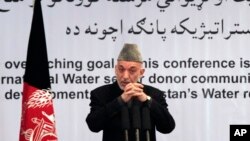ISLAMABAD —
Afghan President Hamid Karzai says that any talks with the Taliban have to be held with the Afghan government. But the Taliban does not consider Karzai's government legitimate, complicating the prospects for peace even as international forces begin their drawdown.
President Hamid Karzai told the country's civil and political leaders Tuesday that any attempts to circumvent the government in talks with the Taliban would only lead to continued bloodshed.
His comments came amid worries that some of the country's powerful and ethnically divided warlords may be trying to cut private deals with the Taliban militants.
He says peace talks should only go through the High Peace Council, a group that includes representatives of Afghans from all ethnic backgrounds.
Karzai helped set up the council in 2010, as a way of trying to convince the Taliban to lay down their weapons and join the political process.
In December, France hosted members of the Taliban, officials from the High Peace Council and senior leaders of the anti-Taliban Northern Alliance for talks about the Afghanistan's future.
But on Tuesday, Karzai warned against any outside country trying to control the peace process.
Andrew Wilder, director of Afghanistan and Pakistan programs at the United States Institute of Peace, said Karzai was most likely referring to actors within the region and the United States, while trying to reassert control over the peace process.
That, Wilder says, is an unrealistic goal.
"That's not generally how peace processes work. They are much messier. It's not just one party controlling the whole process, especially when they are a major belligerent in the conflict," he said.
The Taliban has refused to deal directly with Karzai's government. In a recent statement, it described his leadership as having an "irresponsible political existence" under "American protection."
Kabul-based political analyst Omar Sharifi says the militant group is trying to undermine the legitimacy of Afghanistan's democratic political system.
"In a way we are already seeing it create divisions and cracks within the government - political opposition and all these political circles that are now active in Afghanistan," he said.
Karzai's comments Tuesday came as Afghanistan's top military brass were meeting in Islamabad with Pakistan's military leadership to discuss mutual defense issues.
Pakistani President Ali Zadari said Monday his country would continue its cooperation to ensure lasting peace in the region.
In recent months, Islamabad has released a number of top Taliban leaders, a move which Wilder says aims to ensure that Pakistan's asset - the Taliban - has a seat at Afghanistan's political table. Still, he says it remains to be seen to what extent Pakistan can actually manage the Taliban.











